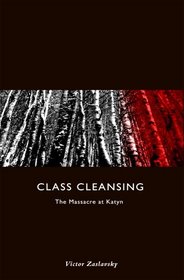Search -
Class Cleansing: The Massacre at Katyn
Class Cleansing The Massacre at Katyn
Author:
Revisiting the events of the 1940 Katyn Massacre, in which some 25,000 Polish prisoners of war were shot by the Soviet secret police on Stalin's orders, Victor Zaslavsky explores a paradigmatic and terrifying example of the policy of class cleansing practiced in the Soviet Union and its occupied territories during World War II. By blaming the Ka... more »
Author:
Revisiting the events of the 1940 Katyn Massacre, in which some 25,000 Polish prisoners of war were shot by the Soviet secret police on Stalin's orders, Victor Zaslavsky explores a paradigmatic and terrifying example of the policy of class cleansing practiced in the Soviet Union and its occupied territories during World War II. By blaming the Ka... more »
ISBN-13: 9780914386414
ISBN-10: 0914386417
Publication Date: 12/1/2008
Pages: 131
Rating: ?
ISBN-10: 0914386417
Publication Date: 12/1/2008
Pages: 131
Rating: ?
0 stars, based on 0 rating
Publisher: Telos Press Publishing
Book Type: Paperback
Members Wishing: 2
Reviews: Amazon | Write a Review
Book Type: Paperback
Members Wishing: 2
Reviews: Amazon | Write a Review
Genres:
- History >> Europe >> General
- History >> Military >> General
- History >> Military >> World War II >> General
- History >> Russia




